Overview Link to this section
Our learning is often provisional and frequently changes with time. Students have an ever-increasing ability, with intentional time, space, and support to set goals, assess learning, track progress, and present their growth - creating an environment where they are co-designers of their learning.
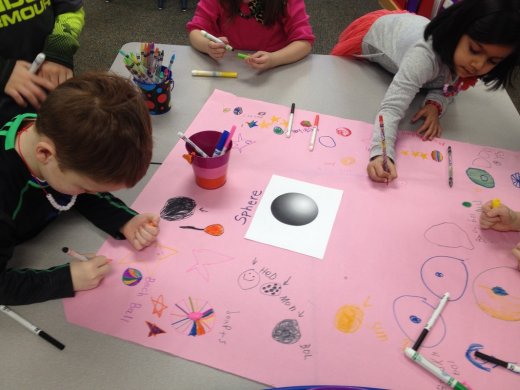
Support students to identify their strengths and challenges by building structures to support them in reflecting on their learning. Include opportunities for students to respond to peer and teacher feedback within instructional arcs. By reflecting on their own learning and that of their peers, students are better equipped to ask for what they need and to use this information to make decisions about their goals, their learning, and their future.
Empowering Students to Own the Assessment Process
Assessment for Learning - Celebrating Learning
Kindergarten teacher Carol Stephenson brings us back inside her classroom to share how she honors her students' work at the end of an inquiry-based exploration. Carol teaches at the Dr. Eric Jackman Institute of Child Study, the lab school at the Ontario Institute for Studies in Education (University of Toronto).
Kindergarten - Sharing Learning/Presentation
At Conway Elementary School, a public school in Escondido, California, students and their families rotate through three stations in which kindergarteners are leaders of their own learning.
Kindergarten - Student Led Conferences
Kindergartner, Trinity, shares her academic progress, supported by evidence from her portfolio, with her parents and teacher, Jennifer Rocker, at Delaware Ridge Elementary School in Kansas City, KS.
Supporting Assessment for Learning Link to this section
Use these practices, and practices like these, to support student thinking and academic ownership
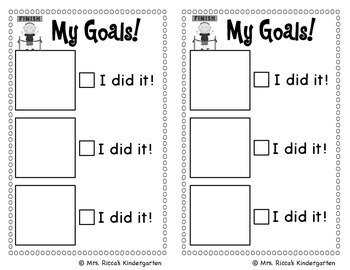
Goal Setting
Kindergarteners' goals will most likely need to be concrete, short-term, and related to their immediate interests. Here are a few ways to promote goal setting with children: Record a child’s goal on paper, then take a picture once the goal has been achieved. Ask the child to list the steps they took to achieve the goal. Share goals that you have created and update children as you meet those goals. Create a group goal and plan a celebration once the goal is reached. During the celebration, review the steps the children took to meet the goal...
Tell, Ask, Give - Feedback
Students tell their peers what they liked about the work. Then, students ask a thoughtful question. This takes some modeling. Last, students give a positive suggestion to improve the work.
I used to think... Now I think...
This routine helps students to reflect on their thinking about a topic or issue and explore how and why that thinking has changed. It can be useful in consolidating new learning as students identify their new understandings, opinions, and beliefs. By examining and explaining how and why their thinking has changed, students are developing their reasoning abilities and recognizing causal relationships.
Models, Critique, & Descriptive Feedback
Ron Berger from EL Education demonstrates the transformational power of models, critique, and descriptive feedback to improve student work. Here he tells the story of Austin's Butterfly. First-grade students at Anser Charter School in Boise, ID, helped Austin take a scientific illustration of a butterfly through multiple drafts toward a high-quality final product.
Student Artifacts Link to this section
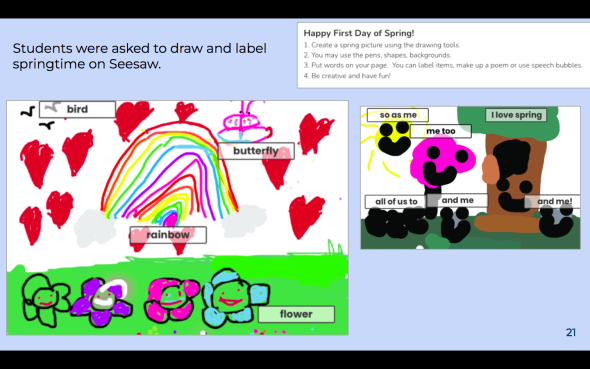
Assessment through Creative Expression
Students use Seesaw to engage in creative expression while practicing foundational writing skills.
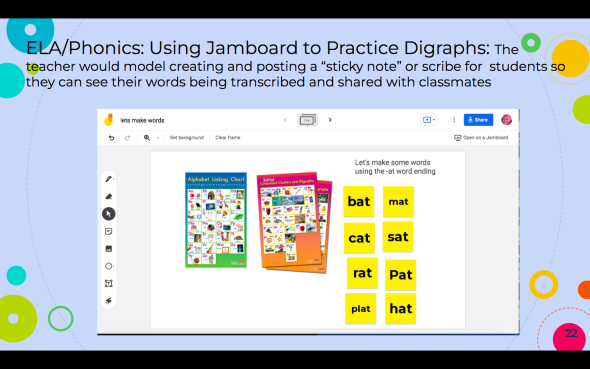
Using Jamboard to Practice Digraphs
With teacher support, students created and posted a “sticky note” of an '-at' word on a class Jamboard to share their thinking and add to a collective word list.
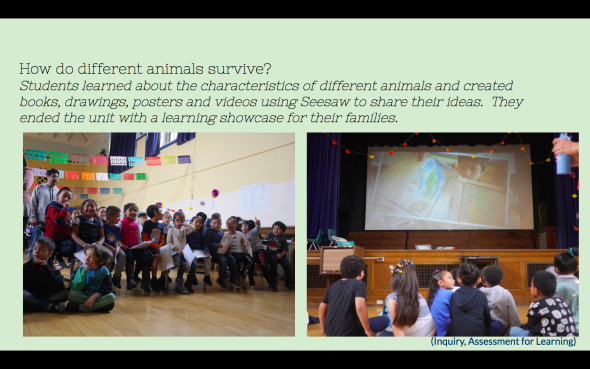
How Do Different Animals Survive? (Learning Showcase)
Giving kindergarten students the opportunity to share new learning with their community, allows them to see the real-world applications of becoming lifelong learners. Kindergarten students in this classroom first learned about the characteristics of different animals and created books, drawings, posters, and videos using Seesaw to share their ideas. They ended the unit with a learning showcase for their families.
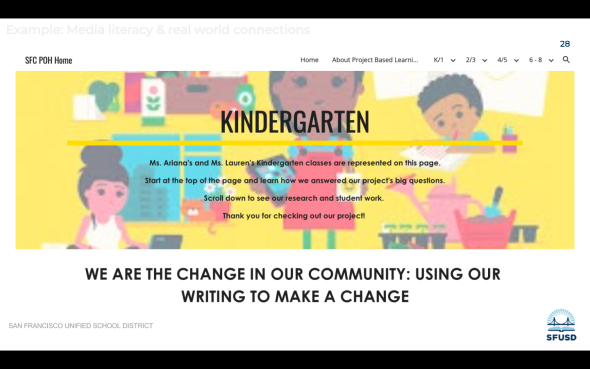
We Are the Change in Our Community; Using Our Writing to Make a Change (Learning Showcase)
Centering on one big grade-level question, "Who and what is important to you ?", kindergarten classes shared their learning process and their new thinking with their school community.
Standards-Based Skills: Students will be able to...
- Make sense of problems and persevere in solving them. (CCSS) (GP)
- Ask and answer questions in order to seek help, get information, or clarify something that is not understood. (CCSS) (GP)
- With guidance and support from adults, respond to questions and suggestions from peers and add details to strengthen writing as needed. (CCSS)
- Use observations to describe patterns and/or relationships in their world in order to answer questions and solve problems. (NGSS)
- Compare predictions (based on prior experiences) to what occurred (observable events). (NGSS)
- Adjust actions and plans when faced with a challenge or problem. (GP)
- Create a goal and do things to complete that goal. (GP)
These skills are taken from the kindergarten standards found within the - Common Core State Standards, Next Generation Science Standards, College Career and Civic Life Framework for Social Studies, ELD Framework, and SFUSD Graduate Profile
Reflection Questions Link to this section
- How can prioritizing assessment for learning develop academic ownership and honor students' experiences?
- Where does assessment for learning currently show up in your practice? What is working well for students? How do you know?
- What are the implications for your own practice? What will you do first?
Want More? Link to this section
- See Demonstration of Learning to learn more about classroom, district, and state assessments
- SFUSD Deeper Learning: Assessment for Learning
This page was last updated on April 27, 2023

